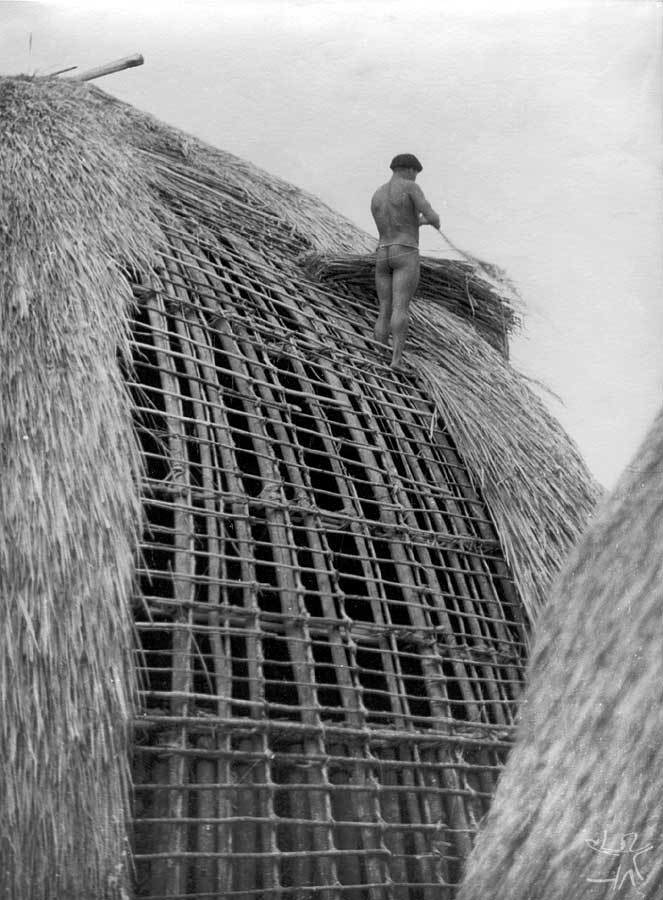Narrated by Ájahi, Kuikuro people, circa 1960
Reworked by Javier Taboada after Bruna Franchetto & Carlos Fausto translation from the Kuikuro
* * * * * *
“I’m going there
walking a little,” she said to her children
then the two women went away
& when the Widow & the Mother-in-law were not so far from the village
they left them
& her children screamed:
“STAY HERE!”
& some said
the Mother-in-law put the Widow in front of herself
& she moved her up
& she moved her up
& she moved her up
on this side
ihhh
they reached almost to the limits of heaven & earth
and there they stayed
they walked up
“well turn your face down
ah”
said the Mother-in-law
“turn your face down!
the face turned down
upside down”
& the Earth appeared upside down
the way down from the sky to above
here
here
above our Earth
then they went away
they stayed right at the beginning
of the main path of the dead
the Mother-in-law brought the Widow
right to the edge of the path
& she erased the Widow’s footprints
so the dead
could not see her footprints
…
they stayed there
at the back of the houses of the dead
& entered a house
directly
over the platform
among the pieces of dried cassava paste
there was a lot of cassava flour stored there
there was a lot of the food
of the dead
the food of the dead
& the Mother-in-law
was sweeping
& the Mother-in-law
was making her unknown
so nobody knew
so nobody knew
& then
“bring me a túhagu”
a dead woman was saying
the dead woman next door said
“LISTEN!”
said the Mother-in-law
“LISTEN!”
“they are trying to speak
those which were our words
& that’s how those which were our words
are here
they were trying to speak
those which were our words”
shortly after she heard:
“bring my igihitolo”’
“LISTEN TO THIS!
“that dead woman refers to the alato
which is the name for a griddle
to cook cassava bread
in the words of the living
but before she has said
‘bring me a túhagu!’
referring to the strainer in which she used to sift for herself
instead of saying angagi
as the living call it
& that’s why
to cook cassava bread
she has said ‘bring my igiholoto’”
“LISTEN!” she said
“this is what those which were our words
are like here”
said the Mother-in-law
“those which were our words were reversed”
COMMENTARY
source. Bruna Franchetto, Carlos Fausto, Ájahi Kuikuro & Jamalui Kuikuro, Mehinaku
Kuikuro, In Kristine Stenzel & Bruna Franchetto (eds.), On this and other worlds: Voices from Amazonia, pp. 23–87. Berlin: Language Science Press, 2017.Anha ituna tütenhüpe itaõ, “The woman who went to the village of the dead”, is a story recorded by Bruna Franchetto & Carlos Fausto in 2004, in Ipatse, the main Kuikuro village, close to the Xingu River in Southern Amazonia, where the Kuikuro people have lived since, at least, the 16th century.
The storyteller was a woman named Ájahi, a renowned ritual specialist and expert singer. Franchetto & Fausto wrote about the story-telling: “In Ájahi’s version, a woman is taken by her dead mother-in-law and by her longing for her dead husband, through the path of the dead (anha) to their celestial village.
“In the afterworld, other words are used, referring to an inside-out world. The text recurrently makes use of the suffix –pe, as in kakisükope, which can be loosely translated as ‘our former words’ or ‘those which were our words’, referring to the words of the living that the dead seek out and transform, in their language of the dead, into other words. … Ájahi insists on the contrast/complementarity between the language of the dead and the language of the living. The suffix -pe here means that the dead are trying to recover their language (that they used when they were alive), but in this effort they only find synonyms in the language of the dead.”


No comments:
Post a Comment